Hello lovelies!
Let’s face it: oily hair can be a constant nightmare. Especially if you have fine strands!
Waking up as if you spent your night in a frying pan is certainly uncomfortable. And there’s worse. Oily hair and scalp can cause several conditions such as seborrheic dermatitis, itching, or even dandruff.
Also, there are less products on the market addressing specific issues of oily hair. While you have plenty of frizzy-fighting and shine-enhancing solutions, you struggle to find the appropriate products for your greasy hair. And this is even more discouraging.
But I have good news for you: you don’t need to get rid of all your natural oils. Indeed, they protect your hair and keep your hair shiny and lustrous. However, you must apply the right oily hair tips to make your hair more manageable.
Here are some habits you can implement daily to take care of your greasy strands.
Disclaimer: This post contains affiliate links. I may earn a commission whenever you click on the links and purchase the products, with no additional cost to you.
What are the causes of oily hair?
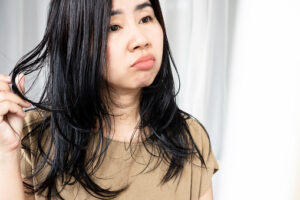
Oily hair is not caused by the hair itself. Indeed, your hair follicles contain sebaceous glands which produce sebum, a.k.a natural oils. These oils keep your hair healthy and moisturized, while preventing infections.
However, for some reasons, sebaceous glands may produce too much oil. Here are some factors causing excessive oil production.
Hormonal change
Sebaceous glands are controlled by hormones. Whenever a change in hormones occur, your sebaceous glands will produce more oil. This applies to teenagers during puberty, or women taking birth control.
Humidity
If you live in a humid environment, less moisture will evaporate from your skin. Consequently, this leads to your hair weighing down.
Genetics
Some people are born with sebaceous glands that produce more oil, just like you have people born with drier hair. This is not something you can control.
Stress
Stress can affect your hormone levels and make your sebaceous glands to produce more oil.
7 habits to control your oily hair
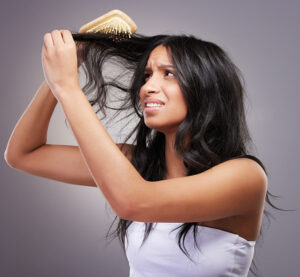
Controlling your oily tresses is not impossible. However, you need to adopt daily healthy habits and stick to them. If you apply them regularly, you will notice tremendous results.
Oily Hair Tips: Wash your hair less often
Contrary to dry hair, many experts recommend you wash your oily hair often. But how often? There is an ongoing discussion about this topic among many experts. For instance, the American Academy for Dermatology says you should wash oily hair everyday, except if it is chemically treated.
However, many other experts believe you should skip hair washing at least once or twice a week. Indeed, many drugstore shampoos contain sulfates. They’re not exactly harmful. But if you wash your hair too often, sulfates may sensitize your scalp. Thus, you can get an itchy scalp and many other inconveniences.
Sometimes, many people with oily hair choose to use dry shampoos. However, too much of dry shampoo increases product buildup on your hair. Actually, dry shampoo dehydrates your scalp and causes it to produce even more oil. As you can see, using dry shampoo is actually counterintuitive.
Therefore, you must choose a sulfate-free shampoo, with natural ingredients to cleanse your hair. And don’t overdo it!
Oily Hair Tips: Apply conditioner properly
Do you think you don’t need a conditioner because you have greasy hair? Then, you’re wrong. Actually, conditioner is necessary for oily hair. It will protect and moisturize your hair, while counteracting the drying effects of shampoo.
However, you must apply your conditioner properly to avoid your hair looking greasy. Just use conditioner off the ends of your strands and not on your scalp.
Also, don’t forget to rinse your hair thoroughly to get rid of any residue. Indeed, your hair might feel greasy because you haven’t rinsed you shampoo or conditioner properly.
Oily Hair Tips: Scrub your scalp regularly
Scrubbing your scalp regularly can help reduce buildup on your scalp. Consequently, you must implement a scalp exfoliant at least once or twice a week.
When you apply the scrub on your scalp, act as if you were applying a facial exfoliant. Gently massage your scrub on your scalp with your fingertips in small and circular motions.
You may choose a scalp exfoliant in the market and make it yourself. If you’re a DIY addict, then tis recipe is for you! Mix two tablespoons of sea salt or brown sugar, two tablespoons of lemon juice, and two tablespoons of olive oil.
Sea salt and brown sugar will help you to get rid of dirt, product buildup, and dead skin from your scalp. Olive oil will add extra moisture and lemon juice will keep the pH of your scalp slightly acidic. If you apply this recipe regularly on your scalp, your greasy hair days will be an old memory!
Oily Hair Tips: Select your hair products carefully
When choosing your hair products, be mindful. Always pick products that are dedicated to your hair issues. Don’t use the products of your girlfriend because it works for her. Always listen to your hair and watch how it reacts with products.
Also, choose hair products with natural ingredients and stay away from certain products. In particular, stay away from “frizz-control” and “shine-enhancing” formulas. Indeed, these products contain silicones which will weigh down your hair. Thus, your hair will look even greasier. Also, silicones prevent beneficial moisture from getting into your hair shaft.
When you buy hair products, avoid those who have ingredients ending in “-cone” in their composition. For instance, you might look for the following ingredients:
- cyclomethicone
- amodimethicone
- dimethicone
Then, what kind of products do you have to choose? Instead of silicones, choose products with volumizing properties. They will lift your hair and keep it away from your oily roots.
Oily Hair Tips: Use the right brushes on your hair
Do you know the legendary tip of the 100 brush strokes before bed? This is said to be very beneficial for hair because it keeps it shiny and healthy. However, during the last ten years, many experts believed that brushing oily hair makes it worse. Where’s the truth?
Actually, brushing oily hair removes and evenly distribute oil among your tresses. Thus, your hair will appear less greasy. All you need is the right kind of brush.
In your case, follow our grandmothers’ lead. They used boar bristle brushes because their natural fibers helped to distribute natural oils throughout the hair. If you’re vegan, you might choose faux boar bristle brushes.
However, I must warn you: don’t over-brush! Indeed, overbrushing can damage your hair and cause unwanted hair loss. Like everything, you must find the right balance when you brush your hair.
Oily Hair Tips: Run away from hair straighteners
If you’re a fan of hair straightening and blow-dry, then I have bad news for you. If you have greasy hair, you must stay away from all those heating tools.
Indeed, with these techniques, your hair will appear even flatter and oilier. Instead, stay natural or favor curly and wavy hairstyles. They will add volume to your hair and make them look less greasy.
Oily Hair Tips: Don’t touch your hair
I know: you are a nervous person. Or you just met a guy that you like and you furiously twirl your hair with your fingers like a blushing teenager. If that’s your case, I advise you to stop now.
Why? Because your fingertips and face produce sebum as well, like your sebaceous glands. And you can inadvertently transfer oil on your hairdo, making your issue worse than ever. Thus, the solution is simple: back off!
Bonus: Pay a regular visit to your dermatologist or hairdresser

Are you confused about the solutions you must try for your oily hair? Then, your dermatologist and/or your hairdresser will help you. As experts, they are well-placed to give the best advice and the best products for your oily hair. Don’t hesitate to visit them regularly.
Summary: how to take care of your oily hair?
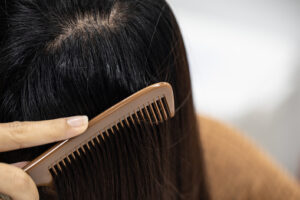
Oily hair are the result of different factors stemming from your scalp, making your hair greasy and oily. However, you can implement daily habits to help you control your oily strands. And don’t forget to visit your dermatologist and your hairdresser to get the best solutions for your hair.
Well, that’s it for today! What are the oily hair tips that you apply? Share them in the comments!
Take care!
Want more content from me? Join my newsletter today and received the latest updates of my website. Also, you’ll receive a wonderful gift in your email!

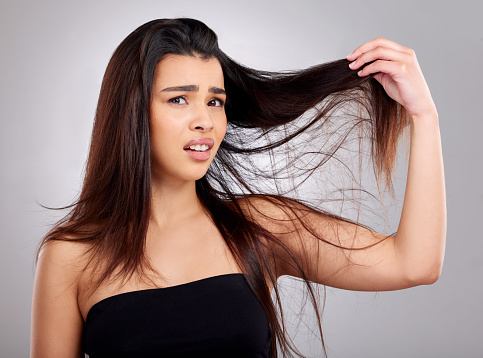

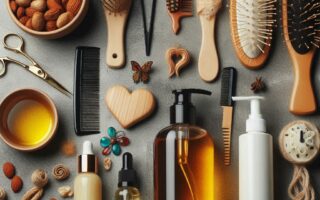

I found these tips to be very helpful when dealing with my oily hair. I do not use chemical styling products in my hair, but my hair looks so oily and sleek. I avoid straightens after realizing they cause heat damage to by hair. Am going to use your guide to look for hair care products to help manage my oily hair.
Hello Jannette, thanks for your comment! And I like your good resolutions too…
Thank you for this most useful advice. You have answered my dilemma on why my hair feels so oily at this time of year only. We have our hottest months in January, February, and March and the humidity here is so high. I feel like I need to wash my hair every day and it seems to get oilier. Now I am going to try your advice and wash less often and see if it helps.
Thanks Michel! Try and get back to me to see how you’re been!
I want to express my gratitude for the insightful and comprehensive information you’ve provided here on oily hair. This is actually a very significant post that needs to be read. I believe that a lot of individuals are having trouble with this. My sister has also been observed searching for further information regarding this topic. I have high hopes that she will find this message to be quite relevant. I am going to send this to her without a doubt. Continue to post in the same manner.
Thanks you very much!
Hi everyone! I stumbled upon this post about 7 tips for managing oily hair, and I just had to share my thoughts. I’ve definitely struggled with oily hair in the past, so I know how frustrating it can be. Not only that, but I was excited to see some new tips that I haven’t tried before.
First, I love the tip about using dry shampoo in between washes. I’ve used dry shampoo before, but I never thought about using it in this way. I’ll certainly be giving that a try. I also love the suggestion to use a clarifying shampoo once a week to remove any buildup. That’s something I’ve been meaning to incorporate into my hair care routine for a while now.
I’m curious to hear if anyone else has tried these tips, or if you have any additional tips of your own. I think it’s always great to share experiences and help each other out.
Another thing I want to mention is the importance of finding the right hair care products for your hair type. It can be overwhelming trying to navigate all the different products on the market, but finding the right ones can make a huge difference in managing oily hair.
Overall, I think this post provides some great advice for managing oily hair. It’s always great to have a few go-to tips to keep our hair looking fresh and clean. I’m definitely going to be using these tips into my own hair care routine.
What do you guys think of these tips? Have you tried any of them before? Let’s start a conversation and share our experiences with each other!
Thanks for your comment!
Let’s face it; we all have bad hair days and mine is when my hair becomes oily. This is something I dread because I have fine strands, thus making my hairline very visible.
Although this is not always the case as I noticed that it only happens when it gets really humid. I put away my hair straightening and hairdryer many years ago and I don’t even use hair conditioners. Also, I wash and shampoo my hair every other day as per advice from my hair stylist.
One tip I heard is to not use the same shampoo and so I buy shampoos in sachets. I don’t know in your country but most products here in the Philippines come in sachets to make them more affordable to every family, lol.
Do you believe that using different shampoos will help with oily or even dry hair?
Hello Alice, thanks for your comment! And yes, I believe in that tip too. I do use different shampoos as well and I have dry hair…
Ugh! After having my son, my hair went from being super dry to oil OVERLOAD! Couple that with the postpartum hair loss, I did not know what to do. It has been a constant struggle between do I oil to try and retain the 3 hairs I have left, or do I skip the oil because my hair is so oily…. Yes insert crying face.
I love the tips you gave though, I feel like they are manageable and will not be detrimental to my remaining 3 hairs.
The scrubbing scalp regularly could also stimulate blood flow to the scalp and in turn should hopefully help with the hair regrowth after the postpartum hair loss. I have not tried this one yet. Thank you!
You’re welcome!
Our hair is not only a reflection of beauty. It tells about our health and neatness. As such, it is important we take care of our hair. You got my attention with the hair oil maintenance strategies. When washing my scalp, I always apply very low pressure and I avoid doing it often.
Good for you !
Wow. Some of these points are so counter-intuitive! I’d never have thought I should wash my hair less – I usually wash it like every 2nd day, AND use a shampoo to help keep my hair dry! I also used to think I don’t really need a conditioner given my hair will just automatically turn oily! The blow drying bit I learnt through bad hair days!
Counterintutitive indeed…